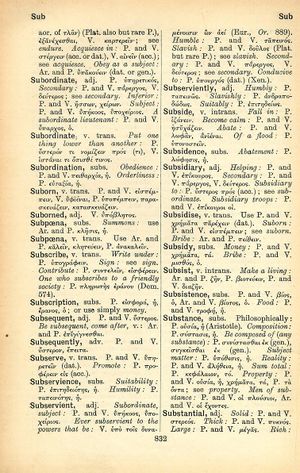subordinate: Difference between revisions
From LSJ
Πολλῶν ὁ καιρὸς γίγνεται διδάσκαλος → Rebus magistra plurimis occasio → Zum Lehrer wird für viele die Gelegenheit
(Woodhouse 5) |
(CSV5) |
||
| Line 1: | Line 1: | ||
{{ | {{Woodhouse1 | ||
| | |Text=[[File:woodhouse_832.jpg|thumb|link={{filepath:woodhouse_832.jpg}}]]'''adj.''' | ||
P. ὑπηριτικός, | |||
<b class="b2">Secondary</b>: P. and V. [[πάρεργος]], V.: [[δεύτερος]]; see [[secondary]]. | |||
<b class="b2">Inferior</b>: P. and V. [[ἥσσων]], [[χείρων]]. | |||
<b class="b2">Subject</b>: P. and V. [[ὑπήκοος]], [[ὑποχείριος]]. | |||
<b class="b2">A subordinate lieutenant</b>: P. and V. [[ὕπαρχος]], ὁ. | |||
'''v. trans'''. | |||
<b class="b2">Put one thing lower than another</b>: P. ὕστερόν τι νομίζειν [[πρός]] (τι), V. ἱστάναι τι ὄπισθέ τινος. | |||
}} | }} | ||
Revision as of 10:05, 21 July 2017
English > Greek (Woodhouse)
adj.
P. ὑπηριτικός,
Secondary: P. and V. πάρεργος, V.: δεύτερος; see secondary.
Inferior: P. and V. ἥσσων, χείρων.
Subject: P. and V. ὑπήκοος, ὑποχείριος.
A subordinate lieutenant: P. and V. ὕπαρχος, ὁ.
v. trans.
Put one thing lower than another: P. ὕστερόν τι νομίζειν πρός (τι), V. ἱστάναι τι ὄπισθέ τινος.

